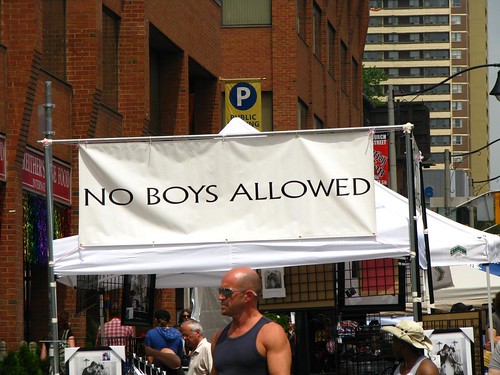I have a long history of struggling with strong feelings for my country and trying to balance my loathing for its incredible capacity for stupidity with a deep appreciation for the autonomy I'm theoretically granted here. Over the last two weeks, this challenging see-saw has become extra-wobbly as a series of proposed bills and speeches by state and federal legislators has reduced my personhood to some combination of whore, cow/pig, and rights-less incubator. If you think I'm joking or exaggerating, please check out those links because, unfortunately, most of that is verbatim.
It's one thing, I think, to grow up female/woman in a country where you know your basic civil liberties are only a handful of decades old, while simultaneously being aware that other women around the world would do an awful lot to have those same opportunities. There's a lot of pushback against people like me who campaign for an end to social discrimination because "feminism isn't necessary anymore." Truthfully, a lot of disenfranchised Americans (female or otherwise) can identify with that basic sentiment; with voting, education, and employment available, many of us are a lot better off than our ancestors 100+ years ago. But that doesn't mean that feminism, or activism more broadly, is redundant. The personhood amendment up for grabs in Colorado, for example, would prevent someone from seeking an abortion even in cases of rape or incest. The long-and-short of it is that, while the amendment protects a foetus from being "killed for the crime of his or her father" (direct quote), it doesn't protect the mother from the same.
I've frothed at the mouth so many times this week that I've been rather dehydrated. Discourses about feminism and women's rights, particularly women's reproductive rights, are always entwined with other discourses around social inequality such as racism, classism, and level of physical or mental ability, but I'm sick of how many things seem able to be diluted to the spectra of sex and gender. In the 21st century, in a country that likes to tout itself as being The Most Advanced On the Planet, basic concepts (such as the fact that I am, in fact, a human and not livestock) seem to elude many of our most powerful. To add insult to injury, it often feels as though I'm a lone (or, if not lone, at least very tiny) voice screaming to an uncaring wilderness.
The balancing factor this week has been the discovery of the Government-Free VJJ movement. While the usual course of writing letters to lawmakers and ceaselessly calling their offices can exacerbate the lonely "I'm talking to a wall!" feeling, a cohesive movement to send a message feels somehow more productive. You can recycle a letter or turn off a phone, but it's difficult to ignore the cute and cuddly vagina that's landed on your desk.
That's right! The Government-Free VJJ movement is a craft-centred form of political protest that facetiously suggests that (primarily male) politicians would stay out of our vaginas and uteri if they had a set of their very own. Whether sewing, crocheting, or knitting, each one takes only about 30 minutes to complete and can be made with relatively cheap supplies. The goal is to send at least one to each politician who has been systematically degrading and violating women's personhoods through speech or proposal. The movement itself has already caught some media attention, which is promising; since I've already knit four, I've spent every stitch envisioning a storm of news coverage about how Washington and state capitols have all been inundated with hand-crafted lady-bits. Even better is trying to imagine the press releases coming from these lawmakers' offices in response to the influx: "Representative England is unavailable, as he is currently trying to figure out how livestock learned to knit."
There's something to be said for the medium of choice, for while a hand-held vagina is difficult to ignore, it also uses trades (sewing, knitting, etc.) that are part of the pantheon of "Things That Only (White?) Women Do Because Men Are Too Busy Running the World." In other words, is it subversive or complicitly patriarchal to use domestic activities to make a political point about women's rights? There's a discussion to be had there, I'm sure, but I have to admit that the excitement of giving lawmakers a bunch of vaginas to ponder has short-circuited my critical thinking skills.
If you're crafty, or wish to learn crafty skills in order to participate in the VJJ movement, check out their website. They have a list of patterns to follow, as well as a sample script to include in your cuddly cooter package. When you're ready to mail yours off, use this form to let the movement's organizers know which politicians you're sending them to. The goal, of course, is maximum distribution! Naturally, I highly encourage all of our readers to produce at least one. As a clarification, this isn't about being pro- or anti-abortion rights (although I'm sure you can guess my opinion). This is about drawing attention to the treatment women, as a very generalized group, are given in a male-dominated political landscape.
When you've made your vajayjay or uterus, take a picture and send it in to Go Girl! We'd love to make a gallery of how Go Folk everywhere envision their crafty political engagement in or with the U.S. After all, in how many countries can you use yarn genitals to make a point?
This post also appears today on Go Girl Magazine.






